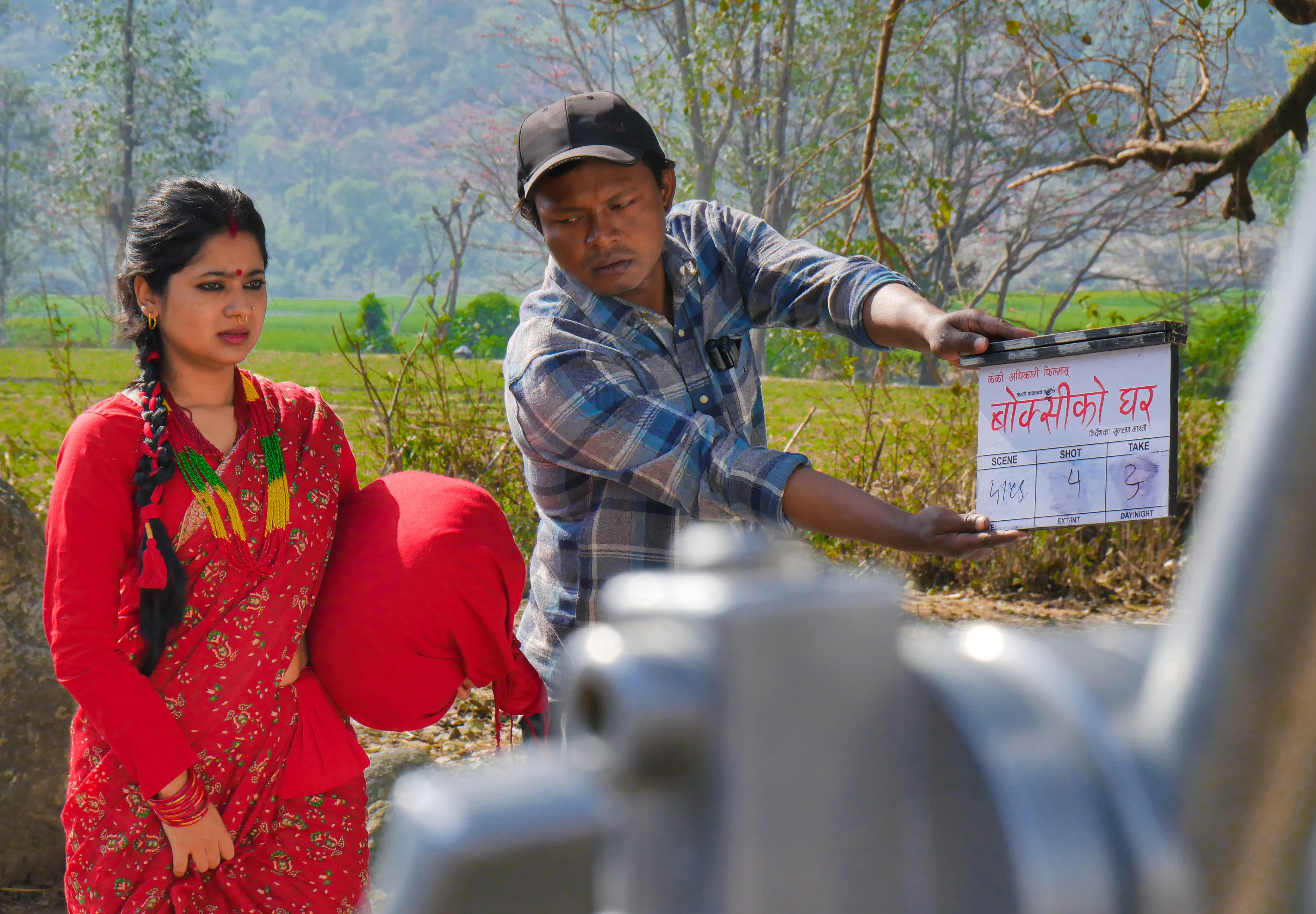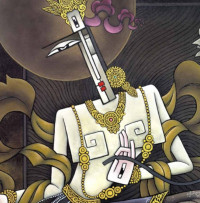Culture & Lifestyle
‘We need more women-centred Nepali movies’
Keki Adhikari discusses her early acting days and the message behind ‘Boksi Ko Ghar’.
Aarati Ray
The inception of the now-successful movie ‘Boksi ko Ghar’ began during the Covid pandemic three years ago when Keki Adhikari stumbled upon the drama of the same title at Mandala Theatre and approached its writer and director, Sulakshan Bharati.
However, on a deeper level, the ‘Boksi ko Ghar’ trajectory might have been set in motion when Adhikari decided to change her career plans from becoming a doctor and left her MBBS preparation. Yes, you heard it right. The actress who has now gained widespread acclaim for her daring role in ‘Boksi ko Ghar’ once aimed to be a doctor but found that acting was what she loved.
“Whether it was a small ad or a big movie, the platform didn’t matter. Just being able to act and appear on screen was the most important thing for me initially,” she reflects. As she gained experience, she realised that she wanted to be more dedicated to the industry, do more research and portray meaningful characters from the depth of her heart. And as per her, ‘Boksi ko Ghar’ is the result of the same realisation.
Adhikari, an actor and social worker now, also works as the managing director of Keki Adhikari Films Pvt Ltd, executive producer of Comedy Champion and director at Junkiri Arts Pvt Ltd.
Adhikari, initially driven by the expectations of family and relatives, subconsciously aimed to become a doctor. Things changed when she participated in a dance reality show, ‘Ghintang’ organised by Nepal Television (NTV) Plus in 2008 while preparing for her MBBS exam. Since then, she found out her true passion lay in the world of art.
During her time on the reality show, little did Adhikari know that a member of an advertising agency had taken notice of her. The agency tracked down her number and invited her to audition for a toothpaste commercial, which she successfully landed paving her way into music videos and movies.
Despite her father Badri Adhikari’s familiarity with the movie industry, she found it difficult to convince him of her career choice. “He was worried about me facing the harsh realities of the movie world,” she recalled. But as she went on and her father saw the resilience in her, Adhikari’s parents eventually accepted her decision.
Adhikari did several music videos and ads before acting in her first movie, ‘Swor’ in 2010.
Throughout her 15 years in the industry, Adhikari has spent most of her time on movie sets, which she calls her “second home”. While she cherishes many memorable moments in the industry, there have also been challenging times.
When she started out in 2010, the industry faced challenges due to political turmoil and socio-economic issues, making it difficult to produce mainstream films. Adhikari, like many others, pursued acting out of passion rather than considering it to be a reliable professional path, therefore she also studied for a Bachelor of Information Management (BIM).
Acting and studying required her full-time attention, leaving little time for relaxation or socialising with friends.
Sometimes, she had to prioritise exams over important acting roles and delays in movie shoots affected her study schedule. This period from 2010 to 2016 was particularly tough, as she had to convince her parents of her career choice and take responsibility for managing her studies and acting commitments. “This made people doubt my dedication to acting, even though I was trying to be fully committed to both,” she recalls.
Still, Adhikari says she has no regrets, “While it was challenging, I made the most of it. Relaxing and having fun felt like a luxury, but I’m proud of persevering. We all have different priorities and have to work diligently for what we choose.”
Eight years into her career, when Adhikari decided to step into production, many people warned her that it might reduce her chances of getting acting roles. Despite her fears and doubts, Adhikari believed that her energy, connections and passion were enough to pursue production. So, in 2018, she leapt and produced her first film, ‘Kohalpur Express’.
The movie was a big learning experience for Adhikari. Managing grievances, ensuring smooth logistics and most importantly, maintaining the team’s spirit proved to be challenging in her new role as a producer.
Even when Adhikari decided to work on ‘Boksi Ko Ghar’, she knew it would be an uphill battle, as it diverged from the prevalent trend in Nepal, which often centred around male protagonists but she was determined. Initially, she planned to target a niche audience but has been pleasantly surprised by the overwhelming response both nationally and internationally.

“This movie is a fight against all kinds of violence towards women. ‘Boksi ko Ghar’ aims to show there’s no such thing as a witch. The ghar (house) of a boksi (witch) is actually in one’s mind, it’s all in our perception”, she added.
She shared that this is also her effort at uprooting the entrenched culture of favouring movies centred around male protagonists and females being overlooked.
Well aware of the continuous presence of judgmental factors and stereotypes for women in the film industry, she shared that the small number of women filmmakers in Nepal shows that the environment for women-led and women-centred filmmaking is still tough with risks.
Adhikari shares that discrimination in the movie industry isn’t explicit; it often comes in subtle layers and hierarchies. When she expressed her desire to make films, she faced doubts about her future opportunities.
“When women in the film industry consider starting a family, they’re often questioned about their commitment to their careers, which can be frustrating,” she expressed. Adhikari also notes that when women lead movies, they may not receive the same level of trust and support as their male counterparts.
She recognises that society has two groups: one that sees women only as symbols and another that fights for equal chances and backs women. “As time moves forward, more and more people are standing up for women’s advancement and their rightful place in the industry,” she says.
Adhikari also recognises the industry’s current diversity, noting a blend of exploring new concepts while still prioritising commercial success and telling socially relevant stories. However, she sees the beauty of art in its ability to showcase diverse stories from different cultures and backgrounds. She emphasises the need for greater diversity and inclusion in the stories told and the characters portrayed, both on and off-screen.
While stories of women and social issues resonate more with Adhikari, she doesn’t want to be boxed into one category, “I want to explore different genres. Even light-hearted movies sometimes can offer hope and meaning to society,” she adds.
Looking ahead, Adhikari wants to keep working on production and acting, with the latter remaining her primary focus. Her next plan is to tell stories that restore hope among the disillusioned youth in Nepal. Above all, her goal is to tell stories passionately, without compromising her artistic integrity.
Adhikari believes that the art field is beautiful, despite its uncertain success. She encourages passionate ones to enter with an open mind, giving their best while having backup plans, “Having alternatives isn’t a weakness. It’s smart planning. We shouldn’t limit ourselves by fearing failure. Instead, we should always be prepared to try, knowing that success may come in unexpected ways,” she says.




 10.12°C Kathmandu
10.12°C Kathmandu















